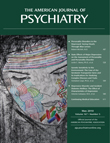Do Antidepressants Alter Emotional Processing in PTSD?
To the Editor: I read with interest the article by Catherine J. Harmer, D. Phil., et al. (1), published in the October 2009 issue of the Journal, on the effects of antidepressants on negative affective bias in depressed patients. The authors raised the possibility that antidepressants exert effects by altering emotional processing early in treatment. They also noted that their results are consistent with cognitive theories of depression.
The study's findings remind me of the effects of selective serotonin reuptake inhibitors (SSRIs) on anger, which I have observed in patients with combat-related posttraumatic stress disorder (PTSD). I've noted that treatment with SSRIs often produces a discernible reduction in observed and internally experienced anger preceding any reduction in other PTSD symptoms or depression. Patients report that their "fuse" seems longer and that they see things that used to make them angry but somehow do not bother them as much. This reduced inclination toward anger frequently occurs within a few days of starting treatment and sometimes occurs at lower than usual doses, consistent with the lower dosing of reboxetine conducted by Harmer et al. Sometimes it is the patient's spouse, not the patient, who first notices that the patient seems less angry. Sometimes the ameliorative effect of SSRIs on anger is reaffirmed with medication discontinuation. I have had spouses correctly suspect that their husband was secretly medication noncompliant based on their perception of his increased anger. One patient, a former Vietnam medic, was able to articulate a change in his perceptions with sertraline discontinuation. Within days, he perceived that people around him were suddenly "lots more angry and difficult." He realized, of course, that this was unlikely and that it was his appraisal of others that had suddenly changed.
These clinical experiences suggest that SSRIs may alter emotional processing in PTSD patients not unlike that seen with reboxetine in depressed patients. (1) Although there are potential alternative explanations for the aforementioned clinical observations (e.g., improvements in anger in PTSD patients may be one aspect of a general SSRI-induced emotional dampening [2] and improvement in anger might be a manifestation of a global improvement in PTSD), the timing of the improvements (i.e., early in treatment) and the reports of altered perception of external events are reminiscent of Harmer et. al's findings. It may be that changes in emotional processing by antidepressants play a role in the treatment of PTSD just as they appear to do in depression.
1 : Effect of acute antidepressant administration on negative affective bias in depressed patients. Am J Psychiatry 2009; 166:1178–1184 Link, Google Scholar
2 : Emotional side-effects of selective serotonin reuptake inhibitors: qualitative study. Br J Psychiatry 2009; 195:211–217 Crossref, Medline, Google Scholar



